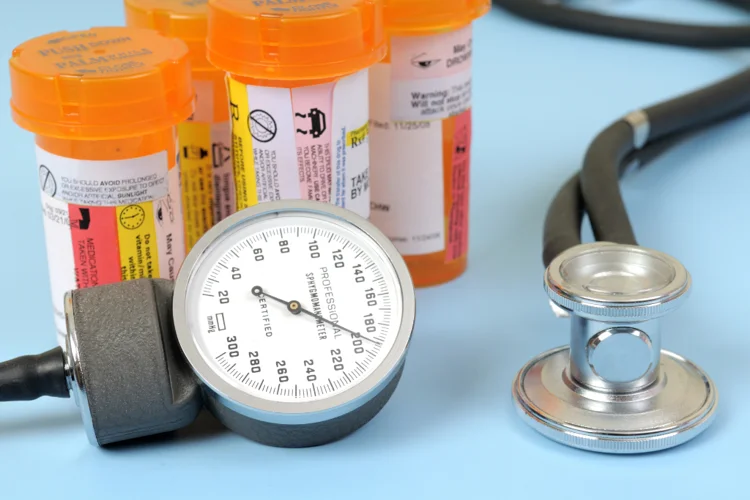High Blood Pressure Medication
What Are High Blood Pressure Medications?
High blood pressure medications help lower blood pressure levels and reduce the
risk of serious health complications. While lifestyle changes such as diet and
exercise are often the first approach, medication may be recommended when blood pressure
remains elevated or when there is a higher risk of health issues.
Hypertension occurs when the force of blood against the artery walls remains consistently
elevated. If left untreated, it can lead to serious complications including heart attack,
stroke,
kidney
failure, and vision loss. These medications typically work by relaxing blood
vessels, reducing fluid buildup, or slowing the heart rate to help bring blood pressure
under control.
Types of High Blood Pressure Medications
Here are the common types of medications used to treat high blood pressure:
|
Medication Type
|
Examples
|
How They Work
|
|
Diuretics (Water Pills)
|
Hydrochlorothiazide, Indapamide, Frusemide
|
Remove excess sodium and water from the body through increased urination.
|
|
ACE Inhibitors
|
Enalapril, Ramipril, Lisinopril
|
Relax blood vessels by preventing the formation of angiotensin II, a narrowing hormone.
|
|
ARBs (Angiotensin II Receptor Blockers)
|
Losartan, Valsartan, Telmisartan
|
Block the effects of angiotensin II, relaxing blood vessels and lowering blood pressure.
|
|
Beta-Blockers
|
Atenolol, Bisoprolol, Metoprolol
|
Reduce heart rate and the force of heart contractions to lower blood pressure.
|
|
Calcium Channel Blockers
|
Amlodipine, Nifedipine, Verapamil
|
Prevent calcium from entering heart and arterial walls, relaxing and widening blood
vessels.
|
|
Direct Vasodilators
|
Hydralazine
|
Directly relax the blood vessel walls, reducing blood pressure.
|
The type of medication prescribed depends on an individual’s specific needs, medical history, and
any underlying conditions, which the doctor will assess to determine the most suitable and effective
treatment.
Potential Side Effects of Blood Pressure Medication
Blood pressure medications can sometimes cause side effects of varying severity depending on the
medication prescribed and how a person’s body responds. Here are some common side effects:
|
Medication Type
|
Common Side Effects
|
| Diuretics (Water Pills) |
Frequent urination, dizziness, dehydration, low potassium levels |
| ACE Inhibitors |
Dry cough, dizziness, skin rash, loss of taste |
| ARBs (Angiotensin II Receptor Blockers) |
Dizziness |
| Beta-Blockers |
Fatigue, cold hands and feet, shortness of breath |
| Calcium Channel Blockers |
Swelling in the lower legs, dizziness, headaches, constipation |
| Direct Vasodilators |
Headaches, joint aches and pains, rapid heartbeat |
Adjusting to High Blood Pressure Medication
To ensure your treatment is as effective as possible, it is important to:
-
Monitor Side Effects: Note any side effects and their frequency. Most side
effects are mild and improve as your body adjusts to the medication.
-
Adhere to Prescriptions: Take your medication exactly as directed to minimise
side effects. Do not stop taking it, even if you start feeling better.
-
Attend Doctor’s Appointments: Regular check-ups allow your doctor to monitor
your progress and adjust your treatment if necessary, such as changing the dosage or prescribing
an alternative medication.
If you experience severe reactions, such as swelling of the face, difficulty breathing, or
unexplained fatigue, stop taking the medication and seek immediate medical attention.
Lifestyle Changes to Support Treatment
In addition to taking prescribed medication, adopting healthy lifestyle habits can further
support blood pressure management and overall heart health:
-
Eat a Heart-Healthy Diet: Focus on fruits, vegetables, whole grains,
and lean proteins while limiting salt, processed foods, and sugar.
-
Maintain a Healthy Weight: Losing excess weight can help lower blood
pressure.
-
Stay Active: Aim for 150-300 minutes of moderate exercise weekly, such
as brisk walking or swimming.
-
Manage Stress: Practise relaxation techniques like meditation, deep
breathing, or yoga.
-
Limit Alcohol and Caffeine: Cutting back on alcohol and caffeine can reduce
blood pressure spikes.
-
Reduce or Quit Smoking: Stopping or limiting smoking improves blood vessel
health and lowers risks of hypertension-related complications.
It is best to consult with your doctor to develop a holistic and suitable plan that combines
medication and lifestyle changes to effectively manage your blood pressure.
Cost of High Blood Pressure Medication
At ATA Medical, we offer screening and treatment for hypertension, and a range of tests to support
heart health. Our
prices are as follows:
|
Treatment
|
Price*
|
| Consultation |
From $49.05 |
| High Blood Pressure Medications |
From $0.27 |
*Prices are NETT and inclusive of GST.
^Prices last updated on
Jan 28, 2026. While every effort is made to keep pricing information up to date, please contact our team to confirm the latest rates.
Where to Get High Blood Pressure Medication?
ATA Medical @ Tanjong Pagar
Address: 72 Anson Rd, #01-02 Anson House, Singapore 079911
Nearest MRT: Tanjong Pagar Station (EW15)
Contact Number: 6223 0682
Email: hi@atamed.sg
Opening Hours:
Mon - Fri: 8:30 AM to 12:30 PM, 1:30 PM to 5:30 PM
Sat: 8:30 AM to 12:30 PM
Sun & PH: Closed
Please note that our last appointment is at 5:15 PM from Monday to
Friday and at 12:15 PM on Saturday. Thank you for your
understanding.
ATA Medical @ Orchard
Address: 1 Orchard Blvd, #05-09 Camden Medical Centre, Singapore 248649
Nearest MRT: Orchard Boulevard Station (TE13)
Contact Number: 6223 0682
Email: camden@atamed.sg
Opening Hours:
Mon - Fri: 8:30 AM to 12:30 PM, 1:30 PM to 5:30 PM
Sat: 8:30 AM to 12:30 PM
Sun & PH: Closed
Please note that our last appointment is at 5:15 PM from Monday to
Friday and at 12:15 PM on Saturday. Thank you for your
understanding.
ATA Medical @ Jurong
Address: 21 Jurong Gateway Rd, #02-08 CPF Jurong
Building, Singapore 608546
Nearest MRT: Jurong East MRT Station (NS1/EW24)
Contact Number: 6348
6292
Email: jurong@atamed.sg
Opening Hours:
Mon - Fri: 8:30 AM to 12:30 PM, 1:30 PM to 5:30 PM
Sat: 8:30 AM to 12:30 PM
Sun & PH: Closed
Please note that our last appointment is at 5:15 PM from Monday to
Friday and at 12:15 PM on Saturday. Thank you for your
understanding.
Navigate to Us
Frequently Asked Questions (FAQ)
The timing for taking high blood pressure medication depends on the specific
drug prescribed and your doctor’s advice. Some medications work better in
the morning, while others may be taken at night. Always follow your doctor’s
instructions for optimal results.
Common medications to lower blood pressure include diuretics, ACE
inhibitors, ARBs, beta-blockers, calcium channel blockers, and direct
vasodilators. Each works differently to help manage hypertension.
The main types of high blood pressure medication include diuretics, ACE
inhibitors, ARBs (angiotensin II receptor blockers), beta-blockers, calcium
channel blockers, and direct vasodilators. Each type targets a specific
mechanism to control blood pressure.
No, you should not stop taking high blood pressure medication without
consulting your doctor, as it can cause a dangerous rise in blood pressure
and increase the risk of stroke or heart attack. However, if you experience
severe allergic reactions, such as swelling of the face, lips, or throat, or
difficulty breathing, stop taking the medication and seek urgent medical
attention.
There is no single “best” medicine for high blood pressure. The most
suitable medication depends on your individual needs, medical history, and
how your body responds to treatment. It is advisable to consult your doctor,
who can assess your condition and recommend the most appropriate option for
you.
No, high blood pressure medications require a doctor’s prescription. At ATA
Medical, we provide screening, and, if necessary, prescribe medication for
high blood pressure, along with a range of tests to support heart health.
Some blood pressure medications, such as beta-blockers, may cause fatigue as
a side effect. If this persists or affects your daily life, consult your
doctor, who can assess whether the dosage needs adjustment or recommend a
more suitable alternative.
While lifestyle changes such as eating a balanced diet, exercising
regularly, managing stress, and reducing sodium intake can help control
blood pressure, they may not replace medication entirely for some
individuals. It is important to consult your doctor before making any
changes.
Common medicines for high blood pressure available in Singapore include
diuretics, ACE inhibitors, ARBs, beta-blockers, and calcium channel
blockers. These medications work in different ways to control blood
pressure, such as relaxing blood vessels, reducing fluid retention, or
slowing the heart rate.
Lifestyle changes, such as reducing salt intake and increasing physical
activity, can help lower blood pressure over time. However, a long-term
commitment is essential to achieve and maintain healthy blood pressure
levels.
Diuretics, such as Hydrochlorothiazide, are commonly prescribed as the first
line of treatment for high blood pressure. They work by helping the body
remove excess sodium and water, reducing the volume of blood in the vessels.
It is advisable to consult a doctor, who can determine the best option for
you based on your condition.
The most suitable medicine for high blood pressure varies for each
individual and depends on factors such as age, overall health, and the
severity of hypertension. Your doctor can assess your condition and
recommend the most appropriate option.
Blood pressure medications are widely used to manage hypertension, but their
safety depends on factors such as individual health conditions, how the body
responds to the medication, potential side effects, and proper adherence to
the prescription. If you have been prescribed medication, it is important to
take it as directed, monitor for side effects, and attend regular follow-ups
with your doctor to assess your progress and make adjustments if needed.
Common side effects include dizziness, fatigue, swelling in the legs, a dry
cough (ACE inhibitors), and low potassium levels (diuretics). Side effects
can vary depending on the type of medication and differ from person to
person. It is important to follow up regularly with your doctor to monitor
your progress and determine if any changes to the dosage or medication are
needed.
The commonly prescribed blood pressure medications include diuretics, ACE
inhibitors, ARBs, beta-blockers, and calcium channel blockers. These
medications work differently to control blood pressure, such as relaxing
blood vessels, reducing fluid retention, or slowing the heart rate. Your
doctor can determine the most appropriate option based on your health
situation and individual needs.
To help lower blood pressure in the short term, you can try relaxation
techniques such as deep breathing, sitting quietly, and reducing immediate
stress. However, underlying issues may still require attention. For
long-term management, consistent use of prescribed medication, lifestyle
changes, and addressing any underlying causes are essential. Always consult
your doctor for personalised advice.
There are no inherently “bad” blood pressure medicines. However, certain
medications may be unsuitable for some individuals due to allergies, side
effects, or interactions with other conditions. If you have been prescribed
medication for hypertension, it is important to follow the dosage
instructions and attend regular follow-ups with your doctor to monitor your
progress and determine if any changes to the dosage or medication are
needed.
Water, herbal teas, and beetroot juice can help lower blood pressure by
improving hydration, promoting relaxation, and supporting blood vessel
function. Limiting alcohol, which can raise blood pressure over time, as
well as caffeine and sugary drinks, which may cause spikes and contribute to
weight gain, can further aid in maintaining stable blood pressure levels.
Diuretics, particularly thiazide diuretics like Hydrochlorothiazide, are
often the first-line treatment for high blood pressure. They work by
removing excess sodium and water to reduce blood volume and lower blood
pressure. Consult your doctor to determine the most appropriate option for
your needs.
Yes, you can generally eat bananas while taking amlodipine. Amlodipine, a
calcium channel blocker, does not significantly affect potassium levels in
the body. However, it is still important to maintain a balanced diet and
consult your doctor, as individual health conditions or additional
medications may influence potassium levels.
If you have been assessed by a doctor and prescribed medication, it is
important to take it as directed, alongside any recommended lifestyle
changes. This helps manage your blood pressure and reduces the risk of
serious complications such as heart attack, stroke, and kidney failure.




